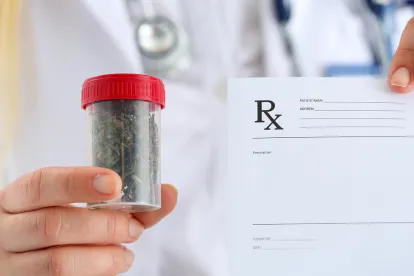On July 2, 2019, New Jersey Governor Phil Murphy signed into law the Jake Honig Compassionate Use Medical Cannabis Act (the “Act”), which amends the New Jersey Compassionate Use Medical Marijuana Act (“CUMMA”) to provide greater clarity on the legal protections for both employers and employees. CUMMA, which was signed into law on January 18th, 2010, legalized the use of medical marijuana for New Jersey residents suffering from a debilitating medical condition.
As originally drafted, CUMMA did not require an employer to accommodate the medical use of marijuana in the workplace. Notwithstanding this, the Plaintiff in Wild v. Carriage Funeral Holdings, Inc. (N.J. Super. Ct. App. Div. Mar. 27, 2019), brought suit against his employer alleging that he was terminated on the basis of his use of medical marijuana in violation of the New Jersey Law Against Discrimination (“LAD”). Although Plaintiff tested positive for marijuana after his employer required him to undergo a drug test, Plaintiff explained that he used medical marijuana as part of his cancer treatment. Nevertheless, defendant terminated plaintiff’s employment based on the positive drug test. Defendant moved to dismiss the case noting that CUMMA did not require an employer to accommodate a medical marijuana user. The trial court agreed and granted the motion to dismiss.
On appeal, however, the appellate court found that CUMMA’s “refusal to require an employment accommodation for a medical marijuana user does not mean that [CUMMA] has immunized employers from obligations already imposed elsewhere.” Accordingly, the Court concluded, CUMMA “does not immunize what the New Jersey Law Against Discrimination prohibits.” The Court specifically noted that CUMMA neither created nor destroyed employment rights and “certainly expressed no intent to alter the [Law Against Discrimination].” For this reason, the Court reversed, holding that the plaintiff could proceed with his claim of discrimination under the LAD.
Acknowledging Wild, the recent amendment to CUMMA, effective immediately, prohibits employers from taking any adverse employment action against a person who is a “registered qualifying patient” based “solely on the employee’s status as a registrant with the [state’s Cannabis Regulatory Commission].” A registered qualifying patient is an individual who: (i) has been authorized by a health care provider for the medical use of cannabis; and (ii) has registered with the state’s Cannabis Regulatory Commission. For purposes of the Act, an adverse employment action includes “refusing to hire or employ an individual, barring or discharging an individual from employment, requiring an individual to retire from employment, or discriminating against an individual in compensation or in any terms, conditions, or privileges of employment.”
Importantly, however, the Act, provides that it does not restrict an employer’s ability to prohibit or take an adverse employment action for “the possession or use of intoxicating substances during work hours.” Likewise, the Act makes clear that it is not intended to “require an employer to commit any act that would cause the employer to be in violation of federal law, that would result in the loss of a licensing-related benefit pursuant to federal law, or that would result in the loss of a federal contract or federal funding.” This means that federal contractors and other employers subject to laws like the Drug-Free Workplace Act will not face conflicting requirements between the Act and federal law. Of course, however, federal law continues to restrict the sale and use of marijuana in all forms.
Finally, although it does not prohibit an employer from conducting drug tests, the Act does impose new obligations on employers when an employee tests positive for marijuana. In that case, an employer must provide the employee or applicant with written notice alerting the individual to: (i) the positive test result; (ii) the individual’s right to provide a “legitimate medical explanation for the positive test result” within three workdays; and (iii) the employee’s right to request a “confirmatory retest of the original sample at the employee’s or job applicant’s own expense.” An employee or applicant may then submit an authorization for medical marijuana issued by a healthcare practitioner, proof of registration with the Commission, or both, to explain a positive test result. Alternatively, the employee or applicant may, within the same three day period, request a confirmatory retest of the original sample at his/her expense.
Employers in New Jersey should review their policies and procedures to ensure compliance with the Act’s requirements.





 />i
/>i

